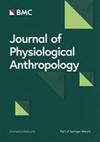Altered neurophysiological responses during empathy for pain in insomnia: evidence from an EEG study in non-clinical samples
IF 3.1
4区 医学
Q1 Social Sciences
引用次数: 0
Abstract
This study aims to investigate the behavioral and neurophysiological changes accompanying the empathy for pain among individuals with insomnia in nonclinical samples, which has been scarcely explored in the existing literature despite the deleterious effects of sleep disturbance on social behavior, and interactions had been well-documented. Twenty-one individuals with insomnia in nonclinical samples and 20 healthy individuals as normal controls participated in the study. Electroencephalograph (EEG) was continuously recorded, while the participants underwent an empathy for pain task. Subjective ratings of pain for painful and non-painful images revealed no statistically significant differences between the insomnia and control groups. The painful images induced a smaller P2 compared to non-painful images in the insomnia group, whereas no such difference was revealed for the controls. Moreover, a higher power density of the alpha and theta2 bands in the posterior brain regions was found in the insomnia group compared to the control group. These findings suggest that individuals with insomnia exhibit altered neurophysiological responses to pain stimuli and a lower capacity to share empathy for pain. These alterations may be associated with changes in attentional mechanisms.失眠症患者对疼痛产生移情时的神经生理反应改变:非临床样本脑电图研究的证据
本研究旨在探讨非临床样本中的失眠症患者在对疼痛产生移情时的行为和神经生理学变化,尽管睡眠障碍对社会行为和互动的有害影响已被充分证实,但现有文献中对这一问题的探讨却很少。21 名非临床样本中的失眠症患者和 20 名健康人作为正常对照组参与了这项研究。研究人员连续记录脑电图(EEG),同时对参与者进行疼痛移情任务。对疼痛和非疼痛图像的主观疼痛评分显示,失眠组和对照组之间没有显著的统计学差异。与非痛苦图像相比,痛苦图像在失眠组中引起的 P2 值较小,而在对照组中则没有发现这种差异。此外,与对照组相比,失眠组大脑后部区域α和θ2波段的功率密度更高。这些研究结果表明,失眠症患者对疼痛刺激的神经生理反应发生了改变,对疼痛的共鸣能力降低。这些改变可能与注意力机制的变化有关。
本文章由计算机程序翻译,如有差异,请以英文原文为准。
求助全文
约1分钟内获得全文
求助全文
来源期刊

Journal of Physiological Anthropology
Social Sciences-Human Factors and Ergonomics
CiteScore
4.80
自引率
6.50%
发文量
39
审稿时长
>12 weeks
期刊介绍:
Journal of Physiological Anthropology (JPA) is an open access, peer-reviewed journal that publishes research on the physiological functions of modern mankind, with an emphasis on the physical and bio-cultural effects on human adaptability to the current environment.
The objective of JPA is to evaluate physiological adaptations to modern living environments, and to publish research from different scientific fields concerned with environmental impact on human life.
Topic areas include, but are not limited to:
environmental physiology
bio-cultural environment
living environment
epigenetic adaptation
development and growth
age and sex differences
nutrition and morphology
physical fitness and health
Journal of Physiological Anthropology is the official journal of the Japan Society of Physiological Anthropology.
 求助内容:
求助内容: 应助结果提醒方式:
应助结果提醒方式:


